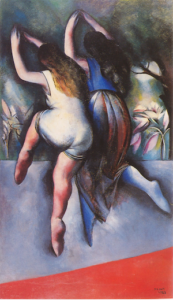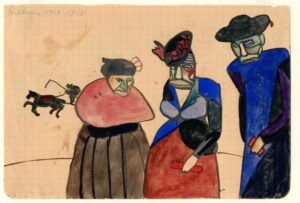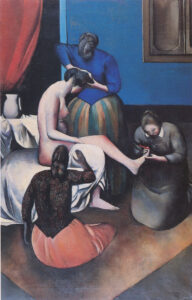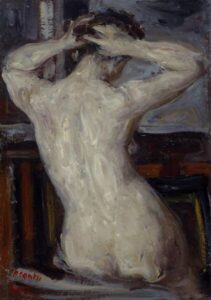Dear Zazie, Here is today’s Lovers’ Chronicle from Mac Tag dedicated to his muse. How does your heart break? In roses and rue? In roses and thorns? In near rhymes and hard times. Rhett
The Lovers’ Chronicle
Dear Muse,
© copyright 2020 mac tag/cowboy coleridge all rights reserved
© copyright 2019 mac tag/cowboy coleridge all rights reserved
you know
when i write
of nothin’,
of as is
and solitude
and this vision
there can only be that
or with you
there is not another
other way to be
“I have been thinking
about feelings:
A musician
puts their feelings
to music. A poet
puts hers to verse.
A singer in her voice
and an artist in their strokes.
But I am not any of these.
So I put mine in silence,
in my thoughts. Can you hear?
Feel my heartbeat from many
miles away. Smell my softness.
Taste my skin. Touch my lips.
See my movements. Dance
in the stillness. Holding on
with arms wide open…”
doubt the blue in the sky
but never doubt,
that i see and feel
with you, with me
with the way it shall be
© copyright 2018 mac tag/cowboy coleridge all rights reserved
of you, i knew
of once ago,
i miss
but
the pull
of solitude
harder to resist
she was pretty
blonde hair, blue eyes
great hands and smile
she asked where i was from,
and when told, said;
i thought i should know you
but what to do with that
nothin’ ventured, nothin’ gained
but nothin’ suits right now
is it thus so,
how a poet’s heart breaks
© copyright 2017 mac tag/cowboy Coleridge all rights reserved
like the wind she broke
when she saw the sage
he let her have
a couple of miles
of free runnin’
on the open trail,
then coaxed her in
his thoughts turned
to how they used
to ride together
he gazed out
on the purple lines
of the pass
and shut his eyes
© copyright 2016 Mac tag/cowboy Coleridge all rights reserved
| Oscar Wilde | |
|---|---|

Photograph taken in 1882 by Napoleon Sarony |
|
Today is the birthday of Oscar Fingal O’Flahertie Wills Wilde (Dublin; 16 October 1854 – 30 November 1900 Paris); playwright, novelist, essayist, and poet. After writing in different forms throughout the 1880s, he became one of London’s most popular playwrights in the early 1890s. He is remembered for his epigrams, his novel The Picture of Dorian Gray, his plays, as well as the circumstances of his imprisonment and early death.
As a spokesman for aestheticism, he tried his hand at various literary activities: he published a book of poems, lectured in the United States and Canada on the new “English Renaissance in Art”, and then returned to London where he worked as a journalist. Known for his biting wit, flamboyant dress and stimulating conversation, Wilde became one of the best-known personalities of his day.
At the turn of the 1890s, he refined his ideas about the supremacy of art in a series of dialogues and essays, and incorporated themes of decadence, duplicity, and beauty into his only novel, The Picture of Dorian Gray (1890). He wrote Salome (1891) in French in Paris but it was refused a licence for England due to the absolute prohibition of Biblical subjects on the English stage. Unperturbed, Wilde produced four society comedies in the early 1890s, which made him one of the most successful playwrights of late Victorian London.
At the height of his fame and success, while his masterpiece, The Importance of Being Earnest (1895), was still on stage in London, Wilde had the Marquess of Queensberry prosecuted for libel. The Marquess was the father of Wilde’s lover, Lord Alfred Douglas. The charge carried a penalty of up to two years in prison. The trial unearthed evidence that caused Wilde to drop his charges and led to his own arrest and trial for gross indecency with men. After two more trials he was convicted and imprisoned for two years’ hard labour.
In 1897, in prison, he wrote De Profundis, which was published in 1905, a long letter which discusses his spiritual journey through his trials, forming a dark counterpoint to his earlier philosophy of pleasure. Upon his release he left immediately for France, never to return to Ireland or Britain. There he wrote his last work, The Ballad of Reading Gaol (1898), a long poem commemorating the harsh rhythms of prison life. He died destitute in Paris at the age of 46.
In honour of his birthday, here is his poem “Roses and Rue”, the Poem of the Day.
Roses and Rue
Could we dig up this long-buried treasure,
Were it worth the pleasure,
We never could learn love’s song,
We are parted too long
Could the passionate past that is fled
Call back its dead,
Could we live it all over again,
Were it worth the pain!
I remember we used to meet
By an ivied seat,
And you warbled each pretty word
With the air of a bird;
And your voice had a quaver in it,
Just like a linnet,
And shook, as the blackbird’s throat
With its last big note;
And your eyes, they were green and grey
Like an April day,
But lit into amethyst
When I stooped and kissed;
And your mouth, it would never smile
For a long, long while,
Then it rippled all over with laughter
Five minutes after.
You were always afraid of a shower,
Just like a flower:
I remember you started and ran
When the rain began.
I remember I never could catch you,
For no one could match you,
You had wonderful, luminous, fleet,
Little wings to your feet.
I remember your hair – did I tie it?
For it always ran riot –
Like a tangled sunbeam of gold:
These things are old.
I remember so well the room,
And the lilac bloom
That beat at the dripping pane
In the warm June rain;
And the colour of your gown,
It was amber-brown,
And two yellow satin bows
From the shoulders rose.
And the handkerchief of French lace
Which you held to your face-
Had a small tear left a stain?
Or was it the rain?
On your hand as it waved adieu
There were veins of blue;
In your voice as it said good-bye
Was a petulant cry,
“You have only wasted your life.”
(Ah, that was the knife!)
When I rushed through the garden gate
It was all too late.
Could we live it over again,
Were it worth the pain,
Could the passionate past that is fled
Call back its dead!
Well, if my heart must break,
Dear love, for your sake,
It will break in music, I know,
Poets’ hearts break so.
But strange that I was not told
That the brain can hold
In a tiny ivory cell
God’s heaven and hell.
The Song of the Day is “Every Rose has it’s Thorn” by Poison. we do not own the rights to this song.
For that is how a poet’s heart breaks. In rhythm and rhyme and much ado, in roses and rue. In near rhymes and hard times. In sonnets and storms, in roses and thorns.
Gallery

Ballerine alla ribalta, 1922

“Tre personaggi a Firenze”

Dopo il bagno, 1922
Mac Tag
Follow us on twitter @cowboycoleridge.


2 Comments on "The Lovers’ Chronicle 16 October – nothin’ – birth of Oscar Wilde – art by Primo Conti"
Trackbacks
[...] was immediately inspired by yesterday’s Poem of the Day, so I began workin’ on my own version of “Roses…
[...] Another from the Dark Muse. I have given up on fightin’ her and now welcome her into my life. …